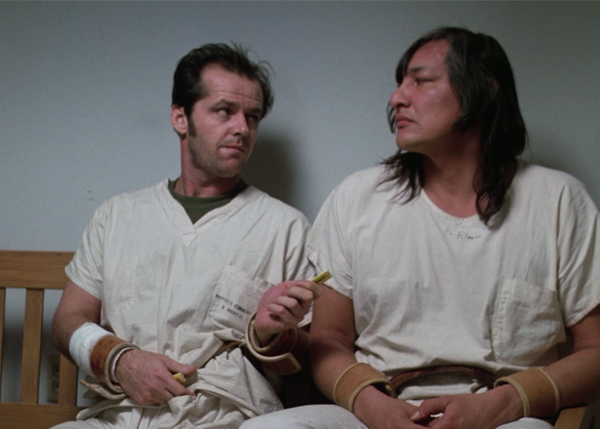The Best Picture Winners: One Flew Over the Cuckoo’s Nest (1975)

Oscar’s 90th birthday is just around the corner and to celebrate, every other day from now through March 4th, I will be taking a look at each and every film selected for his top award – the good, the bad and the sometimes not-so deserving.
I always look forward to what Milos Foreman is going to do next, mainly because going in I have a basic idea of what I’m going to get. He specializes in films about misfits struggling against an immobile system. You can see this on display in best work, in One Flew Over the Cuckoo’s Nest, Amadeus, The People vs. Larry Flynt and Man on the Moon, films about oddballs who aren’t always lovable. Foreman was born in Czechoslovakia and had been working in Europe for a dozen years before Coo Coo’s Nest brought him success in America. He was a new voice in the age of the auteur and fit perfectly into an America that was now comfortably anti-authoritarian.
Based on the satirical 1963 novel by Ken Kesey (which I have read), One Flew Over the Coo Coo’s Nest tells the story of the struggle of Randal P. McMurphy (Jack Nicholson), an inmate confined to a psychiatric hospital in Oregon to break the institutional grip of the head nurse Mildrid Ratched (Best Actress winner Louise Fletcher), who holds her cold iron will over her patients.
I was a fan of the book when I read it as a teenager, particularly Kesey’s use of language and the irony of the fact that the story is narrated by The Chief, a man who never speaks out loud. That irony isn’t present in the movie and, for me, it kind of undercuts what the book was about. The movie hands the story over to McMurphy and perhaps the outsider’s point of view gives us a clearer vantage point. But I remember passages in the book – particularly the chief’s recollection of being force-fed his medication, which he describes as being like a machine – that stayed with me. The movie seems much more straight-forward. That’s not to say that I don’t like the film, in fact I like it very much. But the book had a hold on me that the movie doesn’t quite reach.
What I do like about the film is its ending. There is a long-shot of McMurphy after the revolt, th orgy, the fishing trip, the imaginary baseball game in which he has a moment in which he is found asleep next to an open window. Why is this? What was in his mind? Did he give up? There something in his character that seems to have been defeated by circumstance and I like being left with that question. His warrior spirit has been diminished and it leads to a moment later when his friend makes a spectacular escape, but why does he not serve himself? I’ve been pondering this for years and probably will continue to do so.









